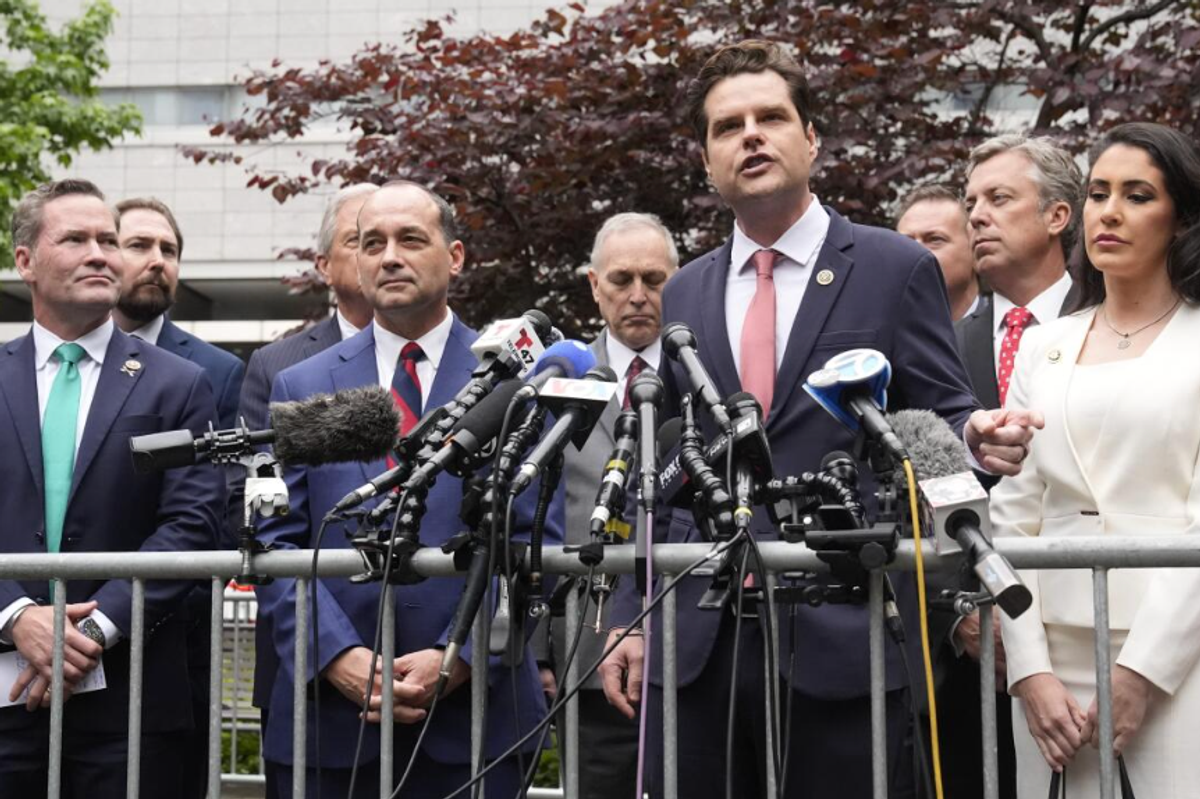Trump Looks More And More Like A Rubber Stamp For A Radical Congress

Reprinted with permission form AlterNet.
By midweek, the pattern of Donald Trump’s relationship with the GOP-controlled Congress has emerged and can be summed up in two words: rubber stamp.
Trump has sat behind the Oval Office desk and wielded his pen, signing executive orders that are fulfilling anticipated attacks on reproductive rights, environmental protections, the Affordable Care Act, immigrant rights, and border security.
The pattern is Congress proposes and Trump disposes, even if the actual details of how these different areas of government, law, and regulation—and eventually the real-life impacts—have yet to be defined, articulated, worked out, or implemented.
But no one should be fooled, in the absence of details, that the deluges are not coming. Nor should they be fooled that Trump is driving this ship, when in fact, it is the GOP-led Congress, which for years has amassed a pile of pet peeves vetoed by Obama, that is the driver here.
Take the dismantling of Obamacare as an example. Most of the national media coverage has simply described the broad outlines of a GOP repeal effort that has not been able to produce details on what would replace the Affordable Care Act. Instead, there’s Trump’s ambitious executive order to do something, and the equally vague Senate budget resolution that says spending cuts must be named at a future point, leaving legislative wrangling to hash it out.
But that’s not the full picture of what’s been happening. With this intentional ambiguity, which serves to deflect public criticism, the GOP has been drawing lines in the sand that are going to spell big trouble for those Americans who need the Affordable Care Act—and will likely impact the fine print of much of the other health policies out there.
Last week, as the Senate passed its budget reconciliation bill signaling the unspecified cuts, the Democrats proposed a series of amendments that were uniformly rejected by the GOP. Those votes are signals of what’s likely to come.
The Democrats tried to block any effort to:
- Reduce or eliminate mental health coverage
- Make cuts to Medicare that would result in higher out-of-pocket costs
- Allow insurers to raise premium costs specifically for women
- Deny coverage because of pre-existing conditions
The Democrats also failed to pass an amendment to allow Medicare to negotiate for lower bulk drug prices. Republicans also rejected proposals to take more time before voting on the next stage of the Obamacare dismantling process. Meanwhile, on the House side, Speaker Paul Ryan has essentially prevented the Congressional Budget Office from updating a prior 2015 report saying that repealing Obamacare would raise the federal deficit by $353 billion.
As Judy Stone, an infectious disease physician, wrote for Forbes, “Do NOT believe the claim from the GOP that pre-existing conditions will not be excluded for anyone who has maintained ‘continuous coverage’ (hasn’t let their coverage lapsed). Too many people will be unable to maintain ‘continuous coverage’ through no fault of their own, or will have lapses due to unemployment, divorce, illness, or bureaucratic snafus.”
Stone listed the first victims of the Obamacare repeal. Rural hospitals will lose funding and jobs due to ACA and Medicaid cuts. Mental health problems and addressing issues like America’s opioid addiction will lose coverage. Having a child with birth defects “will likely bankrupt families without ACA and they will be crushed by lifetime limits.” Children whose parents are keeping them covered through age 26 will be at risk again. Contraceptive coverage “will likely soon be gone,” especially for low-income women.
The Republicans also voted down an amendment to allow children to continue their ACA coverage via Medicaid or the Children’s Health Insurance program, and rejected another amendment that would have made it harder for the Veterans Administration to limit access to VA health care.
Throughout all of this, the GOP keeps saying Obamacare is so unpopular it has to go, lock, stock, and barrel. That’s a talking point not based in the reality that as imperfect as some elements of the program are, it has helped upwards of 25 million people get access to health insurance and coverage, including the nearly 6.4 million people who have signed up for coverage in 2017.
The GOP’s alternatives are all versions of deregulating the law’s elements that provide health security and further privatizing the system. They talk of health care tax credits instead of the ACA’s premium subsidies, but those require sufficient initial income to be taken advantage of. They talk about creating health savings accounts, which would place private investment firms in between one’s savings and health providers—skimming fees and creating bureaucracy.
But the big pattern here—beyond the obvious notion that the GOP is hellbent on a political vendetta to obliterate all things Obama, regardless of their real-life positive impacts for American society—is that Congress is driving this process, not the White House. All Donald Trump is doing is signing papers and citing talking points from the script that’s put before him.
Trump’s not the decider here; he’s a gold-plated rubber stamp.
Steven Rosenfeld covers national political issues for AlterNet, including America’s democracy and voting rights.
IMAGE: U.S. President Donald Trump holds up a signed executive order to advance construction of the Keystone XL pipeline at the White House in Washington January 24, 2017. REUTERS/Kevin Lamarque


